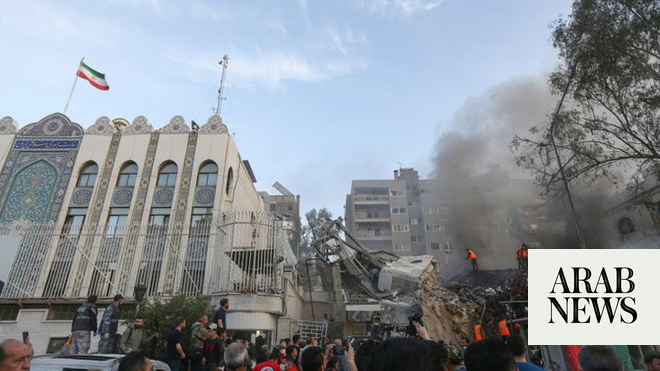
This morning warning sirens sounded across northern Israel as they do most days. The army said later that it was a false alarm. But for the people of Israel it was a reminder — if one were needed — of just how fast and how easily Iran could retaliate if it wanted to.
For north of the border in Lebanon lie some 150,000 missiles pointed at Israel by the Iranian-backed militia Hezbollah. These are not basic rockets fired out of tubes but advanced, accurate and powerful missiles that could reach targets in Israel within minutes. And they could be deployed on Iran"s instructions at a moment"s notice.
And yet despite the reported Israeli retaliation against Iran, the streets of Jerusalem were calm, as people went about their business preparing for Shabbat. Joggers were out in force as usual on the beaches of Tel Aviv. The authorities said there was no change in advice to the public; there were no instructions for people to head to shelters.
This reflected the fact that Israel"s air strike on Iran appeared initially to be limited in scope and scale. Yes, Israel had chosen to attack on the birthday of Iran"s Supreme Leader, Ayatollah Ali Khamenei, who turned 85 today.
But if the strike was against military targets that were perhaps associated with Iran"s attack on Israel last weekend — such as an airbase or drone factory or missile storage facility — then that could be seen as the restrained response Israel"s Western allies were looking for.
Diplomats in Europe and the United States feared Israel could respond with what is known locally as a "spectacular", a strike perhaps that exceeded the scale of Iran"s last weekend that involved more than 300 drones and missiles. Or perhaps that targeted Iran"s nuclear facilities. All of which could have triggered a similar Iranian retaliation, risking all out regional war.
But instead Israel appears to be sending a message to Tehran that it can attack deep within Iranian territory without restraint. In other words, Israel can attack Iran"s nuclear facilities — not far from the reported location of the strike — but chose not to on this occasion.
Jonathan Conricus, a former IDF spokesman, said: "Iran seeks to return to the shadows and is downplaying the Israeli strike on the strategic city of Isfahan, but I think they"ve gotten the message: Israel can penetrate Iranian defences and strike wherever it wants."
By not publicly acknowledging responsibility for the strike — as is commonplace — Israel"s war cabinet may hope to make it more difficult for hardline members of the governing coalition to criticise the limited nature of the attack, thus avoiding a political row over Passover. But that did not restrain some.
Israel"s far-right National Security Minister, Itamar Ben Gvir, said a few days ago he wanted Israel to "go berserk" in response to Iran"s attack. This morning the minister — upon whose faction the Prime Minister, Benjamin Netanyahu, depends — seemed less than impressed. On X, the social media platform formerly known as Twitter, he posted one word, best translated as: "Lame."
Israel"s opposition leader, Yair Lapid, hit back hard at this, posting: "A security cabinet minister has never caused such heavy damage to the country"s security, image and international standing. With an unforgivable, one word tweet Ben Gvir managed to ridicule and embarrass Israel all the way from Tehran to Washington. Any other prime minister would have thrown him out of the cabinet this morning."
There have been reports that some ultra-Orthodox religious leaders had been cautioning the war cabinet about striking without US support, potentially giving Netanyahu cover for a limited attack on Iran. But if this strike is self-contained and not the start of series of attacks, then some Israelis will be unsatisfied.
After Iran"s attack last weekend, I spoke to Daniel Greenzweig, 65, a businessman working in the hi-tech sector, who told me: "We need to hit them and we need to hit them hard. They need to realise that that is not the kind of behaviour that can be tolerated. I am not recommending we destroy their nuclear facilities but, if they did, I wouldn"t have a problem with it."
But not all Israelis share that view. In fact, people have appeared divided over whether — and how hard — their government should strike back.
An opinion poll published earlier this week by the Hebrew University of Jerusalem suggested 52% of people believed Israel should not respond, with 48% saying it should. It also found that only 28% of people supported military action if it led to a larger overall war, with 34% saying they were opposed, with a sizable 38% saying they did not know.
So Israel awaits a response from Iran. Many have woken up with real fear about what could happen next. The risk of miscalculation remains. We do not know yet what further strikes on Iran — if any — are being considered.
I have spoken to international residents in Israel who are actively considering evacuating their families. The Australian government urged its citizens to leave both Israel and the occupied Palestinian territories, citing a "high risk of military reprisals and terrorist attacks". The US embassy in Jerusalem urged American citizens here to be cautious, warning the security environment could change quickly.
The people of Israel had been preparing for the start of the Passover holiday next week. They will now also be waiting to see if and when and how Iran decides to retaliate. — BBC












